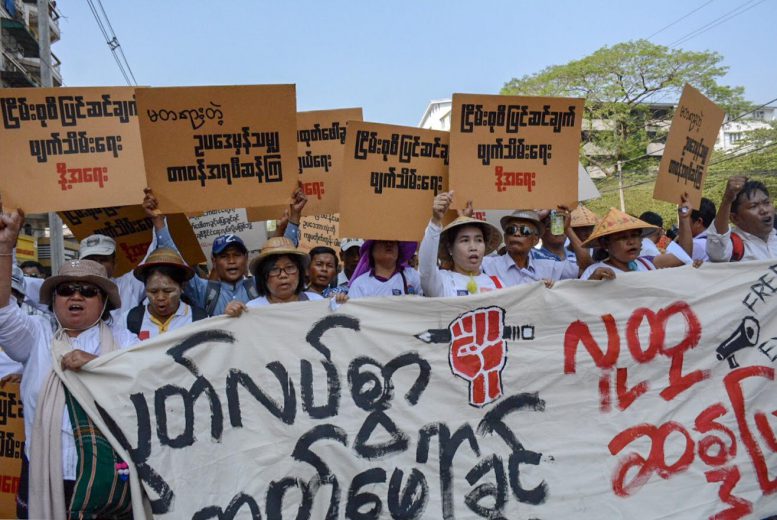Hundreds of demonstrators gathered in Yangon on Monday to protest proposed amendments to already contentious legislation that critics say would further curb the ability of citizens to publically assemble, as Parliament’s Upper House began debate on the changes.
Representatives of nearly 200 civil society organisations marched the three kilometres from Thakhin Mya Park in the city’s southwest to downtown’s Maha Bandoola Park on Monday, many bearing signboards advocating for freedom of expression and urging lawmakers to reject the proposed bill to amend Burma’s Peaceful Assembly and Procession Law. Among the protesters were members of unions representing students, workers and farmers.
Last month, the Upper House Bill Committee submitted the proposed amendments to the assembly law to that chamber’s MPs for debate. Among the most significant alterations sought is a provision requiring citizens or organisations seeking permission to hold a rally to inform the relevant local authorities of how much money would be used to fund the gathering and who exactly would fund it.
The existing provision only requires applicants to present a schedule of when and where they intend to hold an assembly, as well as an estimate of the number of attendees.
The proposed bill adds: “If there is evidence that a person is giving money, material goods or other types of favours [to attendees] to join the assembly, with the intention of disrupting security, rule of law, tranquility or public morality … then he or she may receive a maximum sentence of three years imprisonment and a fine.”
Former lawmaker Nyo Nyo Thin, one of the organisers of Monday’s demonstration, told DVB that Parliament should not approve the amendment bill, which she said was opposed by the public and would not support Burma’s democratic transition.
“If the authorities want to know the invisible hand in some protesting, they can do so in accordance with other existing laws. They don’t need to amend the Peaceful Assembly Law. I believe that the government and the Parliament will do what the people want because they were elected by the vote of the people,” she said.
More than 300 kilometres to Yangon’s north, Upper House lawmakers began debate on the proposed legislation on Monday, with four of five MPs who spoke on the bill’s merits opposing it.
Htay Oo, a lawmaker for the ruling National League for Democracy representing Yangon Region’s constituency No. 2, called for withdrawal of the bill, echoing Nyo Nyo Thin’s concerns about its potential effect on democratic norms and adding that it was contrary to his party’s values.
“The proposed amendments are prone to be unfairly employed by the authorities; the bill is not in line with either legal or democratic standards, or the stance of the NLD,” he said.
“Article 7[a] of the NLD’s manual stipulates that the NLD commits to building a genuine democratic state and 7[d] states that the NLD pledges to prevent any dictatorial and oppressive political system from taking hold in the country. The terms of the proposed bill are not conducive to the objectives set forth by the NLD, thus this bill should be withdrawn.”
The bill was presented to the Upper House on 19 February by Myat Nyarna Soe, an MP for the NLD, reflecting a rare internal schism for a party that holds nearly 80 percent of elected seats in the Union Parliament.
Htay Oo was one of two NLD lawmakers among the four MPs who spoke in opposition to the bill, which is scheduled for further debate in future.
The impetus for the latest push to enact changes to the Peaceful Assembly and Procession Law may have been swirling rumours that a handful of recent protests in support of the military and led by Buddhist nationalist groups were essentially “bought”; that many of those attending the rallies were paid to do so.
Speaking to DVB on Monday, however, Nyo Nyo Thin said a legislative change such as that being put forward in the Upper House was not the answer.
“They [authorities] should find another way,” she said.
[related]
Myat Thu Win, chairman of the Shwe Min Thar Foundation, told DVB that he believed proponents of the bill had their reasons for wanting to amend the existing legislation, but he expressed concern about the changes’ impact on freedom of expression and the right to peacefully assemble in Burma.
“Some people are feeling that the amendments are oppressing them and some are saying that the amendments are restrictive,” he said, asserting that it amounted to an implicit warning “not to protest against the government.”
Su Su Nway, leader of the Myanmar Farmers Union, said her organisation is demanding that the bill be killed. Its members would continue to monitor the ongoing debate in the Upper House, she added.
“We will continue to object and our union will participate in other activities to protest against the bill,” she said.
In addition to Monday’s march in Yangon, the civil society groups involved released a joint statement formalising their opposition to the proposed legislation on the grounds that it threatened freedom of expression by further criminalising it.
With additional reporting by Nay Phyo Win



